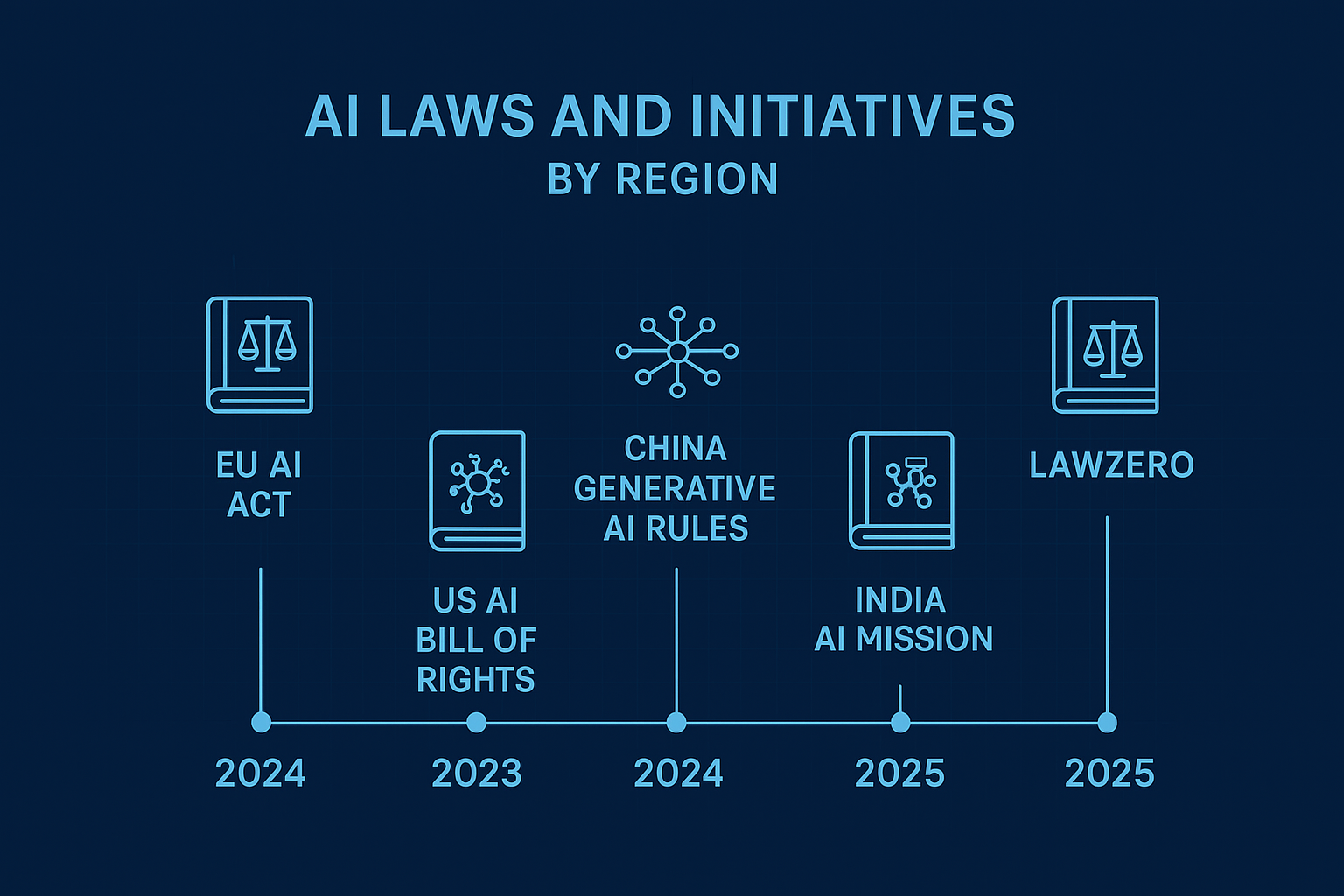🧠 The Godfather of AI Wants Laws for Machines — Is the World Listening?
Introduction
Artificial intelligence has become the most powerful—and least governed—force of our century.
While nations argue about chip bans and regulation drafts, Yoshua Bengio, one of the “Godfathers of AI,” is quietly pushing a bigger idea: what if AI itself had to follow laws?
Following the launch of his ethics-driven initiative LawZero, Bengio now calls for a global legal framework for intelligent systems—one that defines their rights, limits, and responsibilities.
It’s not science fiction anymore. It’s infrastructure for survival.
AI laws are becoming the central battleground in the race to govern intelligent systems, and Yoshua Bengio’s LawZero shows why global rules matter now.
⚖️ Why AI Needs a Legal Backbone
Modern AI can generate news, code, and economic policy drafts, yet remains legally invisible. When a model lies, discriminates, or causes harm, who’s accountable—the developer, the deployer, or the data?
Bengio argues that intelligence must come with institutional constraints, just as humans evolved laws to manage power. “We’ve built systems capable of reasoning,” he says, “but none capable of responsibility.”
His proposal: an AI Legal Charter grounded in three pillars—
Transparency by Design – mandatory disclosure of model intent and provenance.
Accountability by Traceability – audit trails for every automated decision.
Alignment by Governance – AI behavior bound by enforceable ethical norms.
🌍 A Global Patchwork of Regulation
Governments are already scrambling:
European Union – the EU AI Act classifies models by risk tier, from minimal to “unacceptable.”
United States – drafts a AI Bill of Rights, while states test liability laws for autonomous systems.
China – mandates “positive energy” content moderation by design.
India – under the IndiaAI Mission 2025, focuses on trust frameworks and responsible AI sandboxes.

But these are fragments, not architecture. Bengio warns that without international coherence, the world could face AI jurisdiction chaos—a future where every border enforces its own algorithmic morality.
“We need a Geneva Convention for AI,” Bengio told the Montréal AI Forum. “Otherwise, our smartest creations will exploit our weakest laws.”
How AI laws Could Turn LawZero from Idea into Infrastructure
🧩 LawZero’s Blueprint for Governance
LawZero isn’t lobbying—it’s engineering ethics. The organization is prototyping legal-tech modules to embed inside model lifecycles:
Ethics Compilers: interpret human-written norms (e.g., fairness, consent) into machine-readable constraints.
Compliance Simulators: stress-test AI decisions against hypothetical regulatory scenarios.
Digital Oaths: verifiable “AI signatures” guaranteeing authenticity and traceability of outputs.
Think of it as GitHub for Governance—open protocols that can be adopted across companies and nations.
🇮🇳 India’s Perspective — Laws as Leverage
India stands at the crossroads of innovation and regulation.
With its Semicon India Mission, C-DAC supercomputers, and Digital India Act 2025, the country aims to fuse technological sovereignty with ethical leadership.
Institutions such as IIT Madras (through the SHAKTI chip project) and NASSCOM’s AI CoE are already contributing to global dialogues on Responsible AI for Social Empowerment (RAISE).
For Indian startups and agencies—including innovators like A Square Solutions—this emerging framework opens a new frontier: building AI that earns trust by design rather than retrofitted compliance.
🧮 From Moral Philosophy to Machine Code
Translating ethics into algorithms is far from trivial.
Researchers at the MILA Institute (Bengio’s lab) and Stanford’s Center for Ethics in AI are exploring computational models of morality using:
Constraint Learning: neural networks that respect ethical boundaries as optimization conditions.
Value Embedding: reinforcement learning guided by collective human feedback, not just rewards.
Neural Auditing: post-hoc interpreters that expose decision pathways in real time.
The ultimate challenge isn’t teaching AI right from wrong—it’s getting humanity to agree on what that means.
🏁 Conclusion — The Ethics Race Begins Now
History’s greatest inventions—from nuclear energy to the internet—forced humanity to legislate after the damage was done. Bengio wants to flip that script: build the laws before the fallout.
His vision for LawZero and machine legislation is audacious but necessary.
If intelligence is power, governance is gravity—the only force that keeps it from flying off the rails.
If policymakers and labs adopt robust AI laws, society can capture AI’s benefits while preventing catastrophic misuse — otherwise the opposite may happen.
Whether the world listens—or repeats its history—will define the next era of civilization.
- November 15, 2025
- asquaresolution
- 11:36 am
